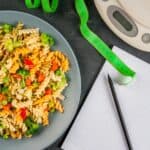Blog

How to eat intuitively with IBS
The idea of combining a therapeutic diet, such a low FODMAP diet for Irritable Bowel Syndrome (IBS), might seem incompatible with Intuitive Eating. But the two are actually more aligned than you might think!
Intuitive Eating is a philosophy designed to re-attune you to your body cues, heal your relationship with food and your body, and empower your food choices.
One of the ten principles of Intuitive Eating is “Respect your body” – this is fundamental in the management of IBS. Let your food choices be guided by how they will make you feel in terms of your overall wellbeing.
The more in tune you are with your body, the better you will be at recognising how different foods affect your IBS symptoms. One way your dietitian may help you to do this is through an elimination diet, such as the low FODMAP diet. The goal of this is to help you to ascertain which foods set off your IBS symptoms through the elimination and re-introduction of common triggers.
Although the low FODMAP diet is quite limiting, it is also temporary (usually two to six weeks) and can be incredibly helpful in the long-term management of IBS.
Try not to look at this time as a period of restriction but as an opportunity to be curious and learn more about your body. It is also best to do this with the support of a dietitian – it can be a complex process and a dietitian is the best person to help you to navigate through it. They’ll also help you to reintroduce foods that you may be unnecessarily avoiding.
Another Intuitive Eating principle that is extremely relevant to the implementation of a low FODMAP diet for IBS is “Make peace with food”. As you learn about which foods trigger your IBS symptoms, you may begin to feel like some foods are “forbidden”.
Give yourself permission to eat them if you want to!
By banning yourself from eating certain foods, your desire for them and the likelihood of bingeing will increase1. Instead of marking them as “off-limits”, acknowledge the way they make you feel and make an informed decision – once in a while, you might decide that the IBS symptoms you are likely to experience afterwards are worth being able to enjoy a favourite meal.
The goal of the low FODMAP diet is not to develop strict food rules, but to help you to make food choices informed by your knowledge and experience with eating.
The gut is a fickle system and there are so many factors that can influence its function. One of these factors includes the connection between the brain and the intestines known as the gut-brain axis2. If you’ve ever suddenly felt the need to use the bathroom right before a stressful meeting, you’ve experienced the gut-brain axis in action!
The gut-brain connection is bi-directional, which means that just as the brain can affect the gut, the gut can affect the brain. This is prominent in IBS, as many people feel embarrassed by their symptoms or guilt when they “break the rules” of their low FODMAP diet. This can cause significant stress and anxiety, which can then worsen the gut symptoms – it’s an incredibly unhelpful cycle to get stuck in!
This is where another Intuitive Eating principle comes into play – “Challenge the food police”. The “food police” is the voice in your head that labels food as “good” or “bad” and shames you for your food choices. Silencing this voice is key to managing your IBS symptoms. Practice listening to and trusting your body instead. You might also like to explore some mind-focused adjunct therapies for IBS such as gut-directed hypnotherapy, which has been shown to be equally as effective as the low FODMAP diet3.
At Embody Health London, we understand the impact that sensitivities and intolerances can have on your relationship with food, and we’re here to support you! Our dietitians can help you to learn to eat intuitively while also meeting your dietary requirements. To get in contact, send us an email at [email protected].
Karli Battaglia MDiet, APD
EHL Team x
References
- Burton A, Abbott M. Conceptualising Binge Eating: A Review of the Theoretical and Empirical Literature. Behaviour Change. 2017;34(3):168-198.
- Kennedy P. Irritable bowel syndrome: A microbiome-gut-brain axis disorder?. World Journal of Gastroenterology. 2014;20(39):14105.
- Peters S, Yao C, Philpott H, Yelland G, Muir J, Gibson P. Randomised clinical trial: the efficacy of gut-directed hypnotherapy is similar to that of the low FODMAP diet for the treatment of irritable bowel syndrome. Alimentary Pharmacology & Therapeutics. 2016;44(5):447-459.














